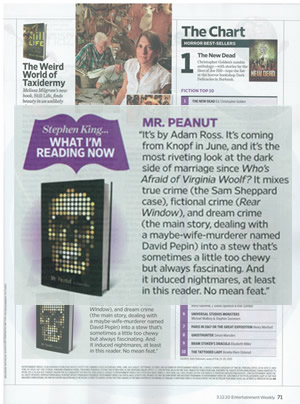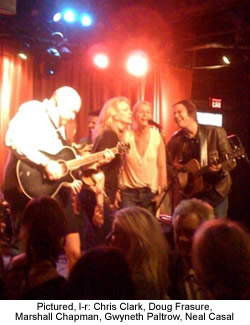Calling Adam Ross: It's Stephen King
What’s new in Tennessee books—and at Chapter 16—on March 11, 2010
Looking back, it’s possible to argue that Adam Ross‘s luck started with an old house in Leiper’s Fork. One afternoon, working as special-projects editor of the Nashville Scene, Ross went with his wife Beth to scout out a nineteenth-century homestead he’d heard might make a good subject for a story. In the course of visiting with the owners of the house, Gary and Diana Fisketjon, the two men “started talking golf,” says Ross, “and that was that. We played our first round at Greystone that weekend.”
At the time, Ross didn’t know that Gary Fisketjon wasn’t just an avid golfer. Fisketjon is also the legendary Knopf editor of such literary luminaries as Raymond Carver, Cormac McCarthy, Richard Ford, and Jay McInerney. Likewise, Fisketjon didn’t know that Ross wasn’t just an alt-weekly editor. He was also an aspiring novelist with both an M.A. and an M.F.A. in creative writing—a writer, moreover, who had worked closely with the likes of Richard Dillard, Stanley Elkin, and William Gass.
The Rosses and the Fisketjons became close friends. “We’re like family,” says Ross (Diana Fisketjon is the godmother of both Ross daughters), and it wasn’t all that long before Ross naturally learned of Fisketjon’s real importance to literature, and Fisketjon naturally learned of the novel Ross was working on. The two men often talked about books, Ross says, “but the subject of my writing, apart from cover stories I wrote for the Scene, never came up. The only advice he gave me with regard to my fiction career was ‘get an agent,’ but he offered no help, nor did I ask. It was an unspoken thing, and, for me, a point of honor, that I earn my way onto his desk.”
That’s exactly what happened. Now, nearly ten years later, Mr. Peanut is the lead Knopf title for spring, and its editor is Gary Fisketjon. “My agent, Susanna Lea, wanted to take my books to auction,” Ross says. “I wanted to work with Gary.” As Fisketjon notes in an open letter to reviewers and bookstore buyers, the whole exchange could have been very awkward: “People in publishing tend to feel anxious when a friend or even an acquaintance from the civilian world hands over a manuscript on which we’re then expected to pass judgment.” Fortunately for the two friends, Fisketjon “was in for an extraordinary surprise,” according to his letter. “Mr. Peanut immediately struck me as being as audacious and fully realized as any first novel I’d encountered as an editor.”
The story of a man who becomes the prime suspect in his wife’s murder, the book won’t be on shelves till June, but the buzz about it is already building. Knopf has ordered an initial print run of 60,000 copies. (The typical first novel starts with 3,000-5,000 copies and never goes to a second printing.) Publisher’s Weekly included the book in its top-ten roundup of “promising fiction debuts” for spring. The Center for Fiction asked a number of prominent writers which books they most look forward to reading in 2010, and novelist John Pipkin singled out Mr. Peanut. And bloggers at sites like Three Guys One Book and Bookdwarf are already saying “it might be one of the best books of the year.”
 But perhaps the most unexpected praise of all so far came this week, when Stephen King, writing in Monday’s Entertainment Weekly, called it “the most riveting look at the dark side of marriage since Who’s Afraid of Virginia Woolf. … And it induced nightmares, at least in this reader. No mean feat.”
But perhaps the most unexpected praise of all so far came this week, when Stephen King, writing in Monday’s Entertainment Weekly, called it “the most riveting look at the dark side of marriage since Who’s Afraid of Virginia Woolf. … And it induced nightmares, at least in this reader. No mean feat.”
Adam Ross’s first reaction to the news: “Oh, my f***ing God.” Then he added: “I’ll take giving Stephen King nightmares as the highest praise I can imagine. The book is obsessed with the danger and saving power of bad dreams about our spouses, and if I made that engaging enough to hold his attention, well, wow. He’s a master at lighting the way down to the worst places and knows all the tricks and secret routes.”
In other book news around the state, Rebecca Skloot‘s The Immortal Life of Henrietta Lacks continues its inexorable march to the sea: this Sunday it will appear in the number-two slot at The New York Times Book Review, and Skloot herself will appear on The Colbert Report at Comedy Central on Wednesday, March 16. For links to the latest reviews and interviews available online, click here.
Also making the move from print to television—though apparently on a more long-term basis—is Chattanooga native Jon Meacham. Already the editor of Newsweek magazine and author of American Lion, a Pulitzer Prize-winning biography of Andrew Jackson, Meacham is reportedly in talks to co-anchor a new PBS series called “Need to Know,” which is set to replace both “Bill Moyers Journal” and “Now” and will air on Friday nights beginning May 7.
Much-decorated Memphis fiction writer Richard Bausch is back in the news this week: his new book, Something Is Out There, is on The New York Times Editor’s Choice list. Read the notation here.
Tennessee writers occupied two of the five slots on this year’s short list for the PEN/Hemingway award, the prestigious prize given each year to a first work of fiction: veteran nonfiction writer (and former Johnson City physician) Abraham Verghese was named runner-up for his debut novel, Cutting for Stone, and Nashvillian Lydia Peelle earned an honorable mention for her first collection of stories, Reasons for and Advantages of Breathing.
At Chapter 16 this week, we’re featuring children’s author Patricia McKissack, who makes a habit of collecting national prizes like the Newbery, and the Caldecott, and the Coretta Scott King Award. When McKissack was growing up during the 1950s, the only building in downtown Nashville that allowed African Americans to walk in the front door was the public library. Now the Nashville Public Library holds more than a hundred books written or co-written by Patricia McKissack. Don’t miss Susannah Felts’s profile here.
And don’t miss this week’s reviews of new books by Matthew Paul Turner, Max Watman, and Michael Wiley. Their subjects range from the evils of Christian music to the pleasures of homemade hooch, with a sprinkling of dead bodies thrown in for good measure. Word is still out on whether this combination would give Stephen King nightmares.
